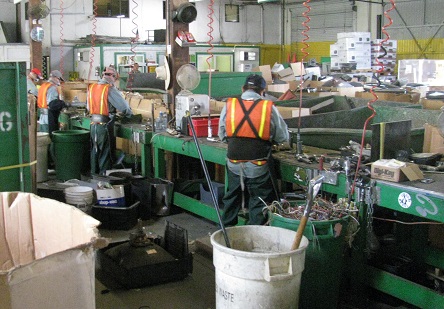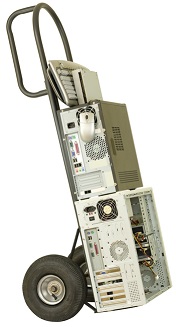Electronic Waste Recycling
Where to send your electronic waste
Introduction
Apart from the issue of data destruction, you need to consider where you will send your disused IT equipment for disposal. For many reasons, you often cannot simply put computers, monitors, printers, or batteries in the trash. Why? Let's cover some background first.
Background
Due to the proliferation of ever cheaper electronics in recent decades, communities throughout the country, and government at all levels, have struggled to adjust our system of garbage management to deal with several problems related to disposal of electronic equipment. The primary issue is the fact that electronics contain toxic chemicals, such as lead and mercury. Theoretically, these can find their way into ground water if computers, monitors, and cell phones are tossed in the landfill. Whether or not this leakage really happens in modern landfills is open to debate, but environmental laws assume it might, and therefore may forbid you from throwing electronics in the trash.
The idea of prohibiting certain materials in garbage is nothing new. Long-standing laws forbid throwing paint, motor oil, antifreeze, or mercury thermometers in the trash, for the same reason electronic waste is prohibited in some locations. Unfortunately, it is not as easy to turn in electronic waste for proper disposal as it is for other hazardous materials such as oil. The electronic waste recycling industry is still comparatively new.
For example, for those who dispose of motor oil regularly (such as auto repair shops), a vast network of haulers and recyclers exists to transport used oil to nearby re-refining stations. And this network is readily available to ordinary people; you can drop off a bucket of oil at most any gas station, and they'll take it for free. From initial disposal to re-refining, recycling oil is a smooth and profitable process.
For IT equipment, the process is relatively tedious. For each item, a recycler must choose whether to extract raw materials or keep the item intact for possible resale. Either option requires a lot of work. To recycle the raw materials, computers and monitors must be manually broken apart into their various components (plastic, metal, rubber, etc.), then further into their chemical components, and finally melted. This is complicated by the presence of lead and phosphors in some equipment that requires special handling that many recyclers are not equipped for. Examining recyclable hardware to see if it's worth reselling, then fixing it up and trying to sell it, are time-consuming activities as well. And all this is further complicated by the expectation of the original equipment owners that all their data will be properly destroyed.

Workers disassemble e-waste in Paramount, Calif., on September 6, 2013
Given this, there are not yet very many facilities that can handle all the tasks required, let alone make it profitable on its output alone.
The industry today
The electronic waste recycling industry is still working out, through competition, what works best. Some try to find anything useful for resale in the pallets of gear they might acquire; others skip all the hassle and send everything to be melted. A few recyclers accept equipment for free, but do not provide the detailed accountability reports that many businesses require, and they keep any money they make from reselling the equipment or raw materials. Others charge for collection, and provide extras such as inventory reports and certificates of data destruction, and even send back some of the money they get from resale.
The government's role in this continues to evolve as well. Despite the conventional wisdom that recycling everything is best, many state and local governments recognize that the technology industry is not ready for government to simply decree that all electronic waste must be recycled. So, a lot of it still goes to the landfill. But, local governments continue to look for ways to encourage development of more viable recycling systems, including encouraging manufacturers of computer equipment to make their wares more amenable to recycling and reuse.
Disposal options
So what can you do? First, you should check with the management of your office building or business park to see if they have an electronic waste collection program. If they do, this should make it much easier for you to comply with local law.
If they don't, you can try to find a local drop-off facility that collects electronic waste. You may find:
- Recycling yards, like the ones for turning in aluminum cans and piles of newspapers;
- Businesses that have a street-side facility waiting for you to bring them your disused hardware;
- A schedule of electronic waste collection "events" held by local governments on various days throughout the year.

For the above, there may be fees based on item count or weight, or there may be limits on how much you can drop off. Municipal services (such as recycling yards or collection events) might be available for residents of that city only, and only for home electronics.
Most computer manufacturers will take back their own end-of-life equipment and recycle it for you, so long as you pay to pack and ship it to them.
Finally, there are companies that focus on "asset recovery", and accept equipment via shipment, or will send a truck to pick up your hardware if you offer a large enough quantity. You can expect all of these companies to charge for their services.
Important: Remember your data. No street-side recycler or retail shop provides accountability reports or certifies the destruction of your data. If you're considering dropping off IT equipment to one of these recyclers, ensure you have a competent professional destroy your data first. Or, send your equipment to a full-service recycler that includes this as part of its service package, such as J.D. Fox Micro.
Legal liability
When choosing a recycling option, you should consider whether the recipient formally assumes liability for its proper disposal (J.D. Fox Micro does). Ideally, you should get a document from the recycler that lists each item by serial number, and specifies that they take title of the equipment. If you don't, and the recycler dumps it illegally, you may be responsible for any government fines for violating environmental laws if it is discovered and traced back to you.
Electronic Waste Recycling
Table of Contents
- Introduction
- Destruction of data for security and privacy
- Where to send your electronic waste
- More options
- Electronics recycling services provided by J.D. Fox Micro